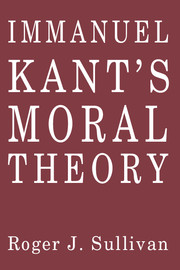Book contents
- Frontmatter
- Contents
- Preface
- Key to abbreviations and translators
- 1 Introduction
- 2 The context for Kant's moral philosophy
- Part I The nature of morality
- 3 The nature of human action
- 4 Prudence: taking care of our own interests
- 5 Morality: living autonomously
- 6 Morally obligatory ends
- 7 The defense of morality
- 8 The primacy of morality
- Part II The moral norm for persons
- Part III The norm for moral judgment
- Part IV Kant on history, politics, and religion
- Appendixes
- Notes
- Bibliography
- Index of names
- Index of subjects
5 - Morality: living autonomously
Published online by Cambridge University Press: 05 June 2012
- Frontmatter
- Contents
- Preface
- Key to abbreviations and translators
- 1 Introduction
- 2 The context for Kant's moral philosophy
- Part I The nature of morality
- 3 The nature of human action
- 4 Prudence: taking care of our own interests
- 5 Morality: living autonomously
- 6 Morally obligatory ends
- 7 The defense of morality
- 8 The primacy of morality
- Part II The moral norm for persons
- Part III The norm for moral judgment
- Part IV Kant on history, politics, and religion
- Appendixes
- Notes
- Bibliography
- Index of names
- Index of subjects
Summary
Since we can have no theoretical insight into the claim that we are moral beings, since that claim cannot be supported by any appeal to experience, Kant contends that it is only by reflecting on our ordinary notion of “moral agency” that we can determine what an agent must be to be a moral agent. And only then are we in a position to support the claim that we are such agents. So in this and the following chapters of this section we first will examine Kant's analysis of the nature of human moral agency, and then go on to his defense of our status as moral agents.
We have already seen that Kant believed that contrasting morality with prudence displays, as no other method can, the distinctive nature of human morality, while also refuting the errors of other philosophers (see, e.g., Gr. 8/397). But he could not have critiqued prudence as he did had he not already taken the defining difference between it and morality to be the subjectivity of the former and the objectivity of the latter. It is the objectivity of morality that requires its rules to be formally and substantively impartial, fit to bind everyone equally; and it is the objectivity of morality that justifies its claim to be overriding, that is, to have rightful priority over all other interests of individuals and groups.
- Type
- Chapter
- Information
- Immanuel Kant's Moral Theory , pp. 44 - 62Publisher: Cambridge University PressPrint publication year: 1989



